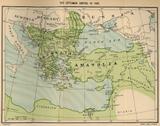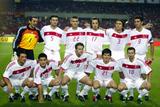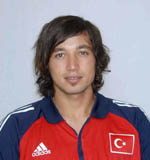


Notice: This is the official website of the All Empires History Community (Reg. 10 Feb 2002)
|
Post Reply 
|
Page 123> |
| Author | ||||
Leopard 
Immortal Guard 
Joined: 10-Jul-2005 Online Status: Offline Posts: 0 |
 Topic: Anatolia Topic: AnatoliaPosted: 18-Dec-2005 at 22:46 |
|||
|
I want to learn the Demographics of Anatolia in year 1000 AD.
I researched about it but I couldn't find anything. Who were living in Anatolia and what did they call themselves in year 1000. What languages were these people speaking?  The geneticists have said that people thousands of years ago who lived in Anatolia ara still living in Anatolia but adopted or had to adopt the turkish identity and language.  What should we call the people of Anatolia since they are not turkish but have been turkified. Roman? Bizantine? Anatolian? Here is the football players of Turkey, Greece and Bulgaria. They look very similar.    Edited by Leopard |
||||
 |
||||
Alkiviades 
Baron 

Joined: 01-Sep-2005 Location: Antarctica Online Status: Offline Posts: 469 |
 Posted: 19-Dec-2005 at 02:54 Posted: 19-Dec-2005 at 02:54 |
|||
|
In 1000 AD? Well... alright, that's a tricky one. If you'd tell me about the classical or post classical times, it would be all the easier. But when it comes to 1.000 AD, things are more obscure, because a lot of "hellenization" and some "romanization" had been concluded by the time, altering decisevly the demographics of the region. I haven't got any book (nor know of any) that deals with the demographics of Anatolia in 1.000 AD. I believe the vast majority of people in the region would identify themselves as "Romaioi", would speak Greek and would be culturally Greek-Orthodox. But as for what ancestry the come from, you'd have to go back to the ancient timesto find the respective people they originate from (so that would yield us Greek, Karians, Phrygian, Paphlagonian, Lydian, Lykian, Cilician, Galatian and several other elements, adding up into the genetic mix that produced the Anatolian people. One can admit that, those genes were difused in the Balkan area as well, but as genetic studies show us the changes people like the Greeks have undergone in the course of time, were rather minimal, despite the constant influx of immigration. You certainly can't call the Anatolians "Romans" or "Byzantines" and be any close to accurate... you could just stick with "Anatolians" or "Hellenized Anatolians" (if you talk about that timeframe). I think there are some comprehensive books dealing with the issue and you can find which they are, by googling a tad or looking in some good online bookstore. |
||||
 |
||||
Leopard 
Immortal Guard 
Joined: 10-Jul-2005 Online Status: Offline Posts: 0 |
 Posted: 19-Dec-2005 at 15:43 Posted: 19-Dec-2005 at 15:43 |
|||
When I said Roman I meant 'Romaioi' anyway. Roman=Romaioi. Then I am correct on my guess that majority of Anatolia was Romios (Rum as they call it in turkey). I want to know which areas of Anatolia the romaioians lived because If you look at the old names of anatolian cities most of them are of greek orijin. Does that this mean that people of these cities were mainy Romaioi. İstanbul; Greek; Constantinopoli,
Stanpoli= to the city.  The so called turks live mainly on the cities cities above. If they were really turks who came from Central Asia the turkish population would be concentrated on the east of Turkey not west as shown in the map. Did Romaioi people live in these cities? Is it possible to call the current Anatolians (so called turks) 'Romaioi'. I especially want to know who lived in the south of Anatolia and middle anatolia. Edited by Leopard |
||||
 |
||||
Kapikulu 
Arch Duke 

Retired AE Moderator Joined: 07-Aug-2004 Location: Berlin Online Status: Offline Posts: 1914 |
 Posted: 19-Dec-2005 at 20:13 Posted: 19-Dec-2005 at 20:13 |
|||
|
I believe you invented here a new term named "so called Turks" In 1000 AD, in the Middle and Western Anatolia, it is so natural that people living there was under ethnic upper identification of what you call Romaioi, as they were under the Roman and Byzantine rule for centuries. But that doesn't mean they were Greek originated.Romaioi doesn't necessarily mean Greek. They just had the upper identification name Romaioi, but they were people living in Anatolia for centuries, under many different empires' rules from Hittites to Lydians, Urartu to Phrygians etc.,generally can be classified as the Hatti,and named in the past according to the places they lived(Galatians,Paphlagonians etc.) In the east it had been a little different. Some Armenians started to choose to Eastern Anatolia as living place and the Turks had slowly started their waves of immigration in that 11th century. So, in the East, it wasn't actually the Romaioi identification they had,as Roman Empire wasn't always effective in the region.But we can still say they some were native of the area, coming from Urartu,Assyrian etc. origins. We should also mention the different Christian kingdoms in different regions(kingdom would be a little "huge" for them,though) in the area, such as Cappadocia,Cilicia(as an answer to the people living in Middle Anatolia,those kingdoms shall not totally be classified as Romaioi).And one more thing to remind is some of the southern and southeastern part of today's Turkey was under the rule Abbasid caliphate.So, there was some Arab population there either, but mainly, Turks(mostly warrior families) were settled around those border provinces because of their combatant and half-nomad characteristics Turks' coming to the place had been by emigration, mainly after battle of Manzikert,1071. We can't put Romaioi and Turk under same category, as the Turks had come to Anatolia with several chains of emigrations. First there were Turkic empires in today's China, later after emigrations, The Karahanlı, Ghaznavid and Seljuk empires were formed, and after another chain of emigration, Turks began emigrating westward and begin to go into Anatolia in large groups. During the Mongolian era,this emigration increased much more, because many Turks living in Khwarazm Empire(Iran, Turkistan) emigrated to Anatolia to run away from Mongols. And that hadn't been enough, they had to move westwards even in Anatolia to run away from the Ilkhanids later on. After that, of course there has been a certain amount of mixing between the Romaioi and the Turks, and even Arabs and Armenians till some extent. It is so natural. But we can't say people living today in Anatolia is the Romaioi, and that would be meaningless. If you go that far, we shall call the people of Anatolia as Hatti. As the original folk of Anatolia,even before the Romans came, was the Hatti(Hatti was not Greek originated at all).We shall include the effects of emigrations here strongly, as Turks had come to Anatolia by this way, either Armenians, either some Romaioi left by this way.And one memorable issue is the natural disasters,such as earthquakes,volcanoes, mostly happened in Roman and Byzantine time,which devastated the cities and killed many. After the Byzantine empire lost its influence in the area, the term/identification Romaioi had lost its importance. The folk in Anatolia was classified by religion: Islamic and non-Islamic. The Islamic folk were the Turks and non-Islamic was classified as Rum and Armenians, the initial one with more density. Most of the non-Islamic population with later emigrations and population exchange of Turkey with Greece in 20th century, and either most of the Islamic population in Balkans, whom were the people sent there in terms of Ottoman Empire's inhabitation politics in Balkans between 14th-16th centuries, emigrated back to Turkey to escape from cruel acts or of newly independent Christian Balkan countries or wars occurred in Balkans in 19th-20th century So we can say all the factors were mixed in Anatolia and interacted, as they lived together for a long time, but we can't call today's Turkey's population as Romaioi. If you go sooooo deep like several centuries in the family lines, you can find some Romaioi roots, but it wouldn't be something abnormal, Turks had become the clear majority in Anatolia after so many emigrations between 11th-13th centuries, but the Turks of course had deep interaction with the other factors living around. The so-called Turks Edited by Kapikulu |
||||
|
We gave up your happiness
Your hope would be enough; we couldn't find neither; we made up sorrows for ourselves; we couldn't be consoled; A Strange Orhan Veli |
||||
 |
||||
Artaxiad 
Baron 

Joined: 10-Aug-2004 Location: Canada Online Status: Offline Posts: 488 |
 Posted: 19-Dec-2005 at 23:17 Posted: 19-Dec-2005 at 23:17 |
|||
|
Armenians and proto-Armenians lived in Eastern Anatolia thousands of years before the arrival of Turkish tribes. I think you mean that certain Armenian noble families established a new Armenian Kingdom (Cilicia), located south-west of the traditional Armenian homeland. |
||||
 |
||||
Sharrukin 
Chieftain 
Joined: 04-Aug-2004 Online Status: Offline Posts: 1314 |
 Posted: 20-Dec-2005 at 02:14 Posted: 20-Dec-2005 at 02:14 |
|||
|
Nothing more really to add. The greater part of Anatolia in the year 1000 was under the rule of Roman emperor based at Constantinople. Hence, Anatolia was "Roman", therefore the Empire was called "Romania". On the fringes to the east, including Transcaucasia was the Caliphate dominated by the Buyids, divided into emirates. Sandwiched in between were several Armenian principalities. To give these peoples some all-inclusive modern name fails to recognize the utter complexity of how Anatolia historically evolved, and therefore a simple name must therefore be completely artificial. As some have pointed out, the "national" name of Rhomaioi only bares on those peoples under the rule of the Emperor at Constantinople. It was not meant to be an ethnic, or racial designation, because those Anatolian peoples obviously had different origins. It's basically the same when we view the people of the United States. We draw from all ethnic backgrounds, but we simply call ourselves "Americans". Sometimes in place of "Americanized" we say "Anglicised" to accent which ethnic group has cultural dominance. The same with modern Turkey. It has many peoples conscious of various ethnic backgrounds but what started as an ethnic name became a national name. Nobody is arguing whether Bulgarians should be called "Bulgarians", despite the fact that it was originally a Turkic tribal name, yet they are Slavs. For an individual to call originally non-Turkish minorities "Roman-Turks" (just as an example) will then run into the problem in trying to pinpoint which populations should be included. Genetics is not going to be much of a help, considering that even ethnic Turks aren't that different genetically from earlier Anatolians. Some historically well attested ethnic groups such as Greeks will have a problem being viewed genetically distinct as well. It is well attested by even ancient Greek authors that those Greeks which migrated into Anatolia intermarried with the natives there. Then, there are groups which were never even a part of the Rhomaioi of the year 1000, like the Kurds and at times the Armenians. Place-names are not going to be of much help either. Leopard's list supposedly is that of Greek cities. The problem is that most of them have linguistic origins other than Greek. These names were simply the Hellenized forms of names of much more ancient non-Greek origin or of Latin origin. Virtually all the major cities of the Middle East and beyond, bore a Hellenized version of their name, therefore these cannot be used as indicators as to "Roman" occupation. No, it becomes rather ill-conceived to try to use historical data to try distinguish modern populations. The further back one goes, the more complex the ethnic situation becomes, and thus the more a modern designation for them becomes irrelevant. |
||||
 |
||||
Alkiviades 
Baron 

Joined: 01-Sep-2005 Location: Antarctica Online Status: Offline Posts: 469 |
 Posted: 20-Dec-2005 at 03:15 Posted: 20-Dec-2005 at 03:15 |
|||
|
Sharrukin has accurately described the whole issue, but he's rather wrong in one aspect: that of the names. The vast majority of the toponyms are Greek, as it is the Greek culture that provided with them and not their native inhabitants - even the names of some people (most, actually) of Anatolia are not their own names but the names the Greeks called them. Let's see the list: İstanbul; Greek; Constantinopoli, Stanpoli= to the city. Greek So the names are Greek and a great number of those people also should be regarded culturally Greeks in the timeframe we are talking about, very much as most of them are nowadays "Turks" (a large chunck of the Greek population also stems from the hellenized and intermixed with Greeks Anatolians). |
||||
 |
||||
The Hidden Face 
Chieftain 
Ustad-i Azam Joined: 16-Jul-2005 Location: Mexico Online Status: Offline Posts: 1379 |
 Posted: 20-Dec-2005 at 03:51 Posted: 20-Dec-2005 at 03:51 |
|||
Canakkale: Modern name of the city, linguistically Turkic (Çanak) + Arabic (Kale). which means "bowl castle."
Kayseri: Caesarea (The city of Caesar)
Uludag: linguistically Turkic. "Olympos" is old name of the city.
Afyon: Arabic. Edited by THE TURK |
||||
 |
||||
Maju 
King 

Joined: 14-Jul-2005 Online Status: Offline Posts: 6565 |
 Posted: 20-Dec-2005 at 07:32 Posted: 20-Dec-2005 at 07:32 |
|||
|
Opium is opium, a big poppy. Marihuana is cannabis... a gree monoic plant of which fibers are stracted for strings and even cloths... apart of ther uses, of course. They are completely diferent plants! Edited by Maju |
||||

NO GOD, NO MASTER! |
||||
 |
||||
Alkiviades 
Baron 

Joined: 01-Sep-2005 Location: Antarctica Online Status: Offline Posts: 469 |
 Posted: 20-Dec-2005 at 09:17 Posted: 20-Dec-2005 at 09:17 |
|||
|
He meant the original name, Dardanos (I assume). But this is not a Greek root anyway, (Dard-). Greek etymology of a Roman root - I said it wasn't Greek myself. A paraphrase of "Olympus" with a Turkic ending. Seems very Greek to me. You are right, the ancient Greek word is opion, Afion is Arabic -> Turkish. Maju, afion means "opium", certainly not marijuana |
||||
 |
||||
kotumeyil 
Chieftain 
Retired AE Moderator Joined: 21-Jun-2005 Location: Turkey Online Status: Offline Posts: 1494 |
 Posted: 20-Dec-2005 at 10:09 Posted: 20-Dec-2005 at 10:09 |
|||
Ulu = great Dağ = mountain ==> Uludağ = Great Mountain |
||||
|
[IMG]http://www.maksimum.com/yemeicme/images/haber/raki.jpg">
|
||||
 |
||||
Alkiviades 
Baron 

Joined: 01-Sep-2005 Location: Antarctica Online Status: Offline Posts: 469 |
 Posted: 20-Dec-2005 at 10:16 Posted: 20-Dec-2005 at 10:16 |
|||
|
...could be a case of counter loan... I don't know, it's suspiciusly similar to "Olympus" (OLY-->ULU) and what's more, it denotes the same city. BTW I've found another reference of Afion, being a counterloan from Greek to Arabic (opion -> afion) and then back to Greek (Afion-afionion). Damn complicated business the linguistics... |
||||
 |
||||
The Hidden Face 
Chieftain 
Ustad-i Azam Joined: 16-Jul-2005 Location: Mexico Online Status: Offline Posts: 1379 |
 Posted: 20-Dec-2005 at 10:58 Posted: 20-Dec-2005 at 10:58 |
|||
As kotumeyil explained, Uludag is clearly turkic. the etymology of the word "ULU": Proto-Turkic: *ulug Altaic etymology: source : Turkic etymology
for the word afyon, my source is Turkish language society. Maybe you are right, but my source refers to arabic. Edited by THE TURK |
||||
 |
||||
Leopard 
Immortal Guard 
Joined: 10-Jul-2005 Online Status: Offline Posts: 0 |
 Posted: 23-Dec-2005 at 18:10 Posted: 23-Dec-2005 at 18:10 |
|||
|
Most of the cities are of greek orijin so they must have a identity. Romaioi is a good term to describe the majority of anatolia, dont forget that Armenia and kurdistan is not part of anatolia actually. After some time it is used to describe the whole of turkey.
By the way turks who came from central asia to anatolia is a minority right now. They make up only %9 of the turkey's current population. This %9 is so mixed that it is impossible to call them turks. Turk is a term used to describe the muslims in anatolia 85 years ago. It doesn't refer to race. The name 'Turk' is a latin and greek orijin. Turcus means 'bizantine' in old latin. Latin orijinated languages such as italian,french, spanish,portugese usually call the so called turks 'TURCO'. Since turco is a latin orijinated word, the names 'turco and turkiya' have been given to turks to mean bizantine muslims. In italian 'turco' means non-christian by the way. In greek, 'tourko-tourkos' words means muslims. In those times, to change a religion meant changing your nation too, so when greeks,romaios etc converted to islam they called themselves tourks. Romios=rum Tourkos=turk Tourk= muslim By the way there hasn't been any emigration form central asiato anatolia. This a big lie. There is not evidence either. |
||||
 |
||||
erci 
Chieftain 

Joined: 22-Jun-2005 Online Status: Offline Posts: 1426 |
 Posted: 23-Dec-2005 at 18:40 Posted: 23-Dec-2005 at 18:40 |
|||
According to greek elemantary school society you are right.You are right about the pictures too, Bulgarians and Greeks do look alike.
These are not cities but small towns or historical site sides(where ruins reside) in western Turkey.Naming a city doesn't make them Greek, Turks change many city names after they migrate to Anatolia but some stayed as it is, so? Edited by erci |
||||
 |
||||
erci 
Chieftain 

Joined: 22-Jun-2005 Online Status: Offline Posts: 1426 |
 Posted: 23-Dec-2005 at 18:51 Posted: 23-Dec-2005 at 18:51 |
|||
Are you ignorant or you're just playing dumb? I'm not gonna explain the origin of the word Turk, read some Central Asian history. Are you one of those greeks that still think about 400 BC. and have orgasm?  |
||||
 |
||||
OSMANLI 
Colonel 

Joined: 24-Nov-2004 Location: North Cyprus Online Status: Offline Posts: 740 |
 Posted: 24-Dec-2005 at 04:27 Posted: 24-Dec-2005 at 04:27 |
|||
|
So i guess the term 'TURKistan' is also Greek Yes the majority of Turks in Anatolia are mixed. But they are Turks. Tell me a race that is 100% pure. On the whole the Turks have mainly Turkic blood. You cannot compare their appearance, the proto-Turkic appearence is already very similar to that of the Meditaranion, many even look Persion. Even the slightest mix could make them seem to look like native meditaranions. However the majority of Turks on close inspection (long thick nose, head shape, hairy, eyes etc) there will be a clue to them being Turks.
You said the during the Ottoman empire all Muslims were called Turk, well actually the Turks themselves did not really call themselves Turks rather they called themselves Ottomans. Turks were often called 'Ottomanos' and the Greeks as 'Romanos' by the Greeks. Maybe that means that the Greeks are infact originating from Rome |
||||
 
|
||||
 |
||||
Leonidas 
Tsar 

Joined: 01-Oct-2005 Location: Australia Online Status: Offline Posts: 4613 |
 Posted: 24-Dec-2005 at 11:39 Posted: 24-Dec-2005 at 11:39 |
|||
|
Leopard here is a tip: provide evidence when making such statments!
When talking about identy you must understand that people mainly define themselves on cultural,social and linguistic grounds more than on actual geneology. This goes for turks and practically every other nation. Shared history-belief and upbringing is a whole lot more influental and important than physical bloodlines. Also, people will define themselves from their own view point, not yours even if you dont accept that definition. If you want to talk about genetics then do so on another thread. Infact the genetics of the anadolians has already been discussed and i recomend you post there or read here Edited by Leonidas |
||||
 |
||||
Herschel 
Pretorian 
Joined: 30-Oct-2005 Online Status: Offline Posts: 172 |
 Posted: 24-Dec-2005 at 12:31 Posted: 24-Dec-2005 at 12:31 |
|||
|
Yes, I think we've concluded that the people in Anatolia who consider
themselves as 'Turks' are very similar to the peoples there 2,000 years
ago. They added to its diversity, never fully replacing it. Perhaps on
average 10% of their blood is from Central Asia, where as the West and
North coast it's probably something like 3%.
Oh, and Keanu Reeves isn't even 1/4th Chinese, let alone half. |
||||
 |
||||
Artaxiad 
Baron 

Joined: 10-Aug-2004 Location: Canada Online Status: Offline Posts: 488 |
 Posted: 24-Dec-2005 at 18:13 Posted: 24-Dec-2005 at 18:13 |
|||
|
I used to think he was Lebanese.
 Edited by Artaxiad |
||||
 |
||||
Post Reply 
|
Page 123> |
| Forum Jump | Forum Permissions  You cannot post new topics in this forum You cannot reply to topics in this forum You cannot delete your posts in this forum You cannot edit your posts in this forum You cannot create polls in this forum You cannot vote in polls in this forum |
Copyright ©2001-2009 Web Wiz
This page was generated in 0.072 seconds.











 Anatolia
Anatolia Printable Version
Printable Version Google
Google Delicious
Delicious Digg
Digg StumbleUpon
StumbleUpon Windows Live
Windows Live Yahoo Bookmarks
Yahoo Bookmarks reddit
reddit Facebook
Facebook MySpace
MySpace Newsvine
Newsvine Furl
Furl Topic Options
Topic Options from centuries ago.For the Thrace area in Turkey's land,I can say it is mainly the inhabitation policy of the Ottoman Empire, bringing the Turk population to Thrace after conquering the area.
from centuries ago.For the Thrace area in Turkey's land,I can say it is mainly the inhabitation policy of the Ottoman Empire, bringing the Turk population to Thrace after conquering the area.
 Ilhan Mansiz- Turkish footballer, he is also in the image of the Turkish football team that you depicted. He looks like a pure Turkic person. Nose, eyes, face shape, hair all are give aways.
Ilhan Mansiz- Turkish footballer, he is also in the image of the Turkish football team that you depicted. He looks like a pure Turkic person. Nose, eyes, face shape, hair all are give aways. Serdar Ortac- Turkish popstar. If you were to insist that he was mixed one would think he had a Mongolian mix rather than a 'Greek' mix
Serdar Ortac- Turkish popstar. If you were to insist that he was mixed one would think he had a Mongolian mix rather than a 'Greek' mix Keanu Reeves- Is half Chinese and half-English. Reeves's appearence clearly shows how easy it is for eastern traits to look more western with even the sligtest mix. Although again upon close inspection the clues are there.
Keanu Reeves- Is half Chinese and half-English. Reeves's appearence clearly shows how easy it is for eastern traits to look more western with even the sligtest mix. Although again upon close inspection the clues are there.